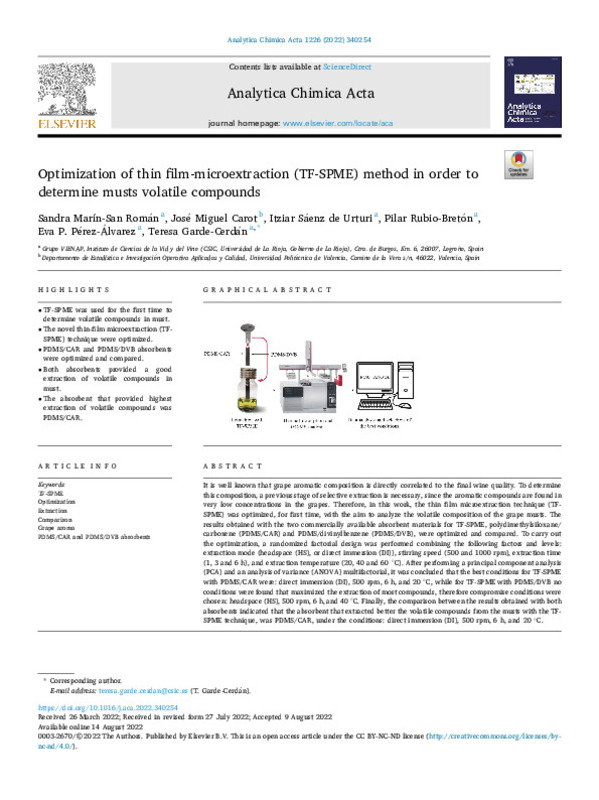JavaScript is disabled for your browser. Some features of this site may not work without it.
Buscar en RiuNet
Listar
Mi cuenta
Estadísticas
Ayuda RiuNet
Admin. UPV
Optimization of thin film-microextraction (TF-SPME) method in order to determine musts volatile compounds
Mostrar el registro sencillo del ítem
Ficheros en el ítem
| dc.contributor.author | Marín-San Román, Sandra
|
es_ES |
| dc.contributor.author | Carot Sierra, José Miguel
|
es_ES |
| dc.contributor.author | Sáenz de Urturi, Itziar
|
es_ES |
| dc.contributor.author | Rubio-Bretón, Pilar
|
es_ES |
| dc.contributor.author | Pérez-Álvarez, Eva P.
|
es_ES |
| dc.contributor.author | Garde-Cerdán, Teresa
|
es_ES |
| dc.date.accessioned | 2023-04-05T18:00:39Z | |
| dc.date.available | 2023-04-05T18:00:39Z | |
| dc.date.issued | 2022-09-15 | es_ES |
| dc.identifier.issn | 0003-2670 | es_ES |
| dc.identifier.uri | http://hdl.handle.net/10251/192714 | |
| dc.description.abstract | [EN] It is well known that grape aromatic composition is directly correlated to the final wine quality. To determine this composition, a previous stage of selective extraction is necessary, since the aromatic compounds are found in very low concentrations in the grapes. Therefore, in this work, the thin film microextraction technique (TF-SPME) was optimized, for first time, with the aim to analyze the volatile composition of the grape musts. The results obtained with the two commercially available absorbent materials for TF-SPME, polydimethylsiloxane/carboxene (PDMS/CAR) and PDMS/divinylbenzene (PDMS/DVB), were optimized and compared. To carry out the optimization, a randomized factorial design was performed combining the following factors and levels: extraction mode (headspace (HS), or direct immersion (DI)), stirring speed (500 and 1000 rpm), extraction time (1, 3 and 6 h), and extraction temperature (20, 40 and 60 degrees C). After performing a principal component analysis (PCA) and an analysis of variance (ANOVA) multifactorial, it was concluded that the best conditions for TF-SPME with PDMS/CAR were: direct immersion (DI), 500 rpm, 6 h, and 20 degrees C, while for TF-SPME with PDMS/DVB no conditions were found that maximized the extraction of most compounds, therefore compromise conditions were chosen: headspace (HS), 500 rpm, 6 h, and 40 degrees C. Finally, the comparison between the results obtained with both absorbents indicated that the absorbent that extracted better the volatile compounds from the musts with the TF-SPME technique, was PDMS/CAR, under the conditions: direct immersion (DI), 500 rpm, 6 h, and 20 degrees C. | es_ES |
| dc.description.sponsorship | Financial support was given by the Ministerio de Ciencia, Innovacion y Universidades under the project RTI2018-096549-B-I00. S. M. -S. -R. thanks Gobierno de La Rioja for her predoctoral contract. E.P. P.-A. thanks the Ministerio de Ciencia, Innovacion y Universidades for her postdoctoral contract. | es_ES |
| dc.language | Inglés | es_ES |
| dc.publisher | Elsevier | es_ES |
| dc.relation.ispartof | Analytica Chimica Acta | es_ES |
| dc.rights | Reconocimiento - No comercial - Sin obra derivada (by-nc-nd) | es_ES |
| dc.subject | TF-SPME | es_ES |
| dc.subject | Optimization | es_ES |
| dc.subject | Extraction | es_ES |
| dc.subject | Comparison | es_ES |
| dc.subject | Grape aroma | es_ES |
| dc.subject | PDMS/CAR and PDMS/DVB absorbents | es_ES |
| dc.subject.classification | ESTADISTICA E INVESTIGACION OPERATIVA | es_ES |
| dc.title | Optimization of thin film-microextraction (TF-SPME) method in order to determine musts volatile compounds | es_ES |
| dc.type | Artículo | es_ES |
| dc.identifier.doi | 10.1016/j.aca.2022.340254 | es_ES |
| dc.relation.projectID | info:eu-repo/grantAgreement/AEI/Plan Estatal de Investigación Científica y Técnica y de Innovación 2017-2020/RTI2018-096549-B-I00/ES/NANOELICITORES: TECNOLOGIA INNOVADORA PARA MEJORAR LA CALIDAD DE LA UVA Y DEL VINO EN UN ESCENARIO DE CAMBIO CLIMATICO/ | es_ES |
| dc.rights.accessRights | Abierto | es_ES |
| dc.contributor.affiliation | Universitat Politècnica de València. Escuela Técnica Superior de Ingenieros Industriales - Escola Tècnica Superior d'Enginyers Industrials | es_ES |
| dc.description.bibliographicCitation | Marín-San Román, S.; Carot Sierra, JM.; Sáenz De Urturi, I.; Rubio-Bretón, P.; Pérez-Álvarez, EP.; Garde-Cerdán, T. (2022). Optimization of thin film-microextraction (TF-SPME) method in order to determine musts volatile compounds. Analytica Chimica Acta. 1226:1-12. https://doi.org/10.1016/j.aca.2022.340254 | es_ES |
| dc.description.accrualMethod | S | es_ES |
| dc.relation.publisherversion | https://doi.org/10.1016/j.aca.2022.340254 | es_ES |
| dc.description.upvformatpinicio | 1 | es_ES |
| dc.description.upvformatpfin | 12 | es_ES |
| dc.type.version | info:eu-repo/semantics/publishedVersion | es_ES |
| dc.description.volume | 1226 | es_ES |
| dc.identifier.pmid | 36068056 | es_ES |
| dc.relation.pasarela | S\471676 | es_ES |
| dc.contributor.funder | Gobierno de La Rioja | es_ES |
| dc.contributor.funder | Agencia Estatal de Investigación | es_ES |
| dc.contributor.funder | Ministerio de Ciencia, Innovación y Universidades | es_ES |








